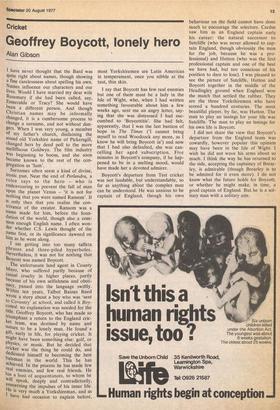Cricket
Geoffrey Boycott, lonely hero
Alan Gibson
I have never thought that the Bard was quite right about names, though showing a fine carelessness about spelling his own. Names influence our characters and our lives. Would I have married my dear wife Rosemary if she had been called, say, Esmeralda or Tracy? She would have been a different person. And though Christian names may be informally Changed, it is a cumbersome process to Change a surname, and not without dangers. When I was very young, a member of my father's church, disdaining the Sound old Yorkshire name of Pickersgill, changed hers by deed poll to the more mellifluous Goldwyn. The film industry Was beginning to boom, and she soon became known to the rest of the congregation as 'Sam'.
Surnames often seem a kind of divine, Ironic pun. Near the end of Perlandra, a voice says to the hero who is endeavouring to prevent the fall of man upon the planet Venus 'it is not for nothing that you were named Ransom'. It IS only then that you realise the contrivance of the creator. Ransom was a name made for him, before the foundation of the world, though also a common enough English name. I often wonder whether C.S. Lewis thought of the name first, or its significance dawned on him as he went along.
I am getting into too many taffeta Phrases and three-piled hyperboles. Nevertheless, it was not for nothing that Boycott was named Boycott.
The unfortunate land agent in County Mayo, who suffered partly because of casual cruelty in higher places, partly because of his own selfishness and obstinacy, passed into the language swiftly. Within ten years, Talbot Baines Reed wrote a story about a boy who was 'sent to Coventry' at school, and called it Boycotted.. no explanation was needed for the title. Geoffrey Boycott, who has made so triumphant a return to the England cricket team, was destined by name and nature to be a lonely man. He found a gift, early in life, for playing cricket. It might have been something else: golf, or PhYsics, or music. But he decided that cricket was the thing he could do, and dedicated himself to becoming the best batsman in the world. This he has achieved. In the process he has made few real enemies, and few real friends. He has a host of acquaintances, to whom he Will speak, deeply and contradictorily, concerning the impulses of his inner life. He is very much a Yorkshireman, and as I have had occasion to explain before,
most Yorkshiremen are Latin American in temperament, once you nibble at the taut, thin skin.
I say that Boycott has few real enemies but one of them must be a lady in the Isle of Wight, who, when I had written something favourable about him a few weeks ago, sent me an angry letter, saying that she was distressed I had succumbed to `Boycottitis'. She had felt, apparently, that I was the last bastion of hope in The Times ('I cannot bring myself to read Woodcock any more, as I know he will bring Boycott in') and now that I had also defaulted, she was cancelling her aged subscription. Five minutes in Boycott's company, if he hippened to be in a melting mood, would have made her a devoted admirer.
Boycott's departure from Test cricket was not laudable, but understandable, so far as anything abbut the complex man can be understood. He was anxious to be captain of England, though his own behaviour on the field 'cannot have done much to encourage the selectors. Cardus saw him as an England captain early his career: the natural successor to Sutcliffe (who was never allowed to captain England, though obviously the man for the job, because he was a professional) and Hutton (who was the first professional captain and one of the best we have had, but too conscious of his position to dare to lose). 1 was pleased to see the picture of Sutcliffe, Hutton and Boycott together in the middle of the Headingley ground when England won the match that settled the rubber. They are the three Yorkshiremen who have scored a hundred centuries. The most beautiful player, by far, was Hutton. The man to play an innings for your life was Sutcliffe. The man to play an innings for his own life is Boycott.
I did not share the view that Boycott's departure from the England team was cowardly, however popular this opinion may have been in the Isle of Wight. I wish he did not wave his arms about so much. I think the way he has returned to the side, accepting the captaincy of Brearley, is admirable (though Brearley is to be admired for it even more). I do not know what the future holds for Boycott, or whether he might make, in time, a good captain of England. But he is a solitary man with a solitary aim.































 Previous page
Previous page